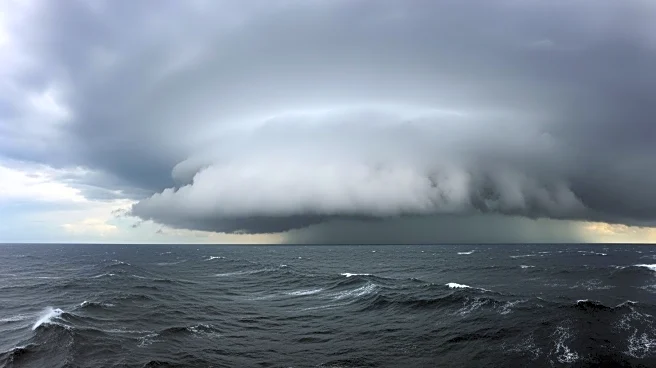What's Happening?
Typhoon Kalmaegi has claimed 114 lives in the Philippines, with 127 individuals reported missing as the storm continues to wreak havoc. The typhoon has regained strength and is now moving towards Vietnam, prompting mass evacuations in anticipation of
further destruction. The storm has caused severe flooding, sweeping away vehicles and damaging infrastructure in affected areas. The Philippines, a nation frequently impacted by tropical cyclones, is experiencing its 20th storm this year, highlighting the ongoing challenges in disaster management and preparedness.
Why It's Important?
The devastation caused by Typhoon Kalmaegi highlights the urgent need for effective disaster response and preparedness strategies in regions prone to natural disasters. The high death toll and widespread damage underscore the vulnerability of communities in the Philippines and Vietnam, necessitating international support and collaboration to address immediate needs and long-term resilience. The storm's impact on infrastructure and livelihoods could have significant economic repercussions, affecting local industries and the broader economy. The situation also emphasizes the importance of climate change adaptation measures to mitigate the effects of increasingly severe weather events.
What's Next?
As Typhoon Kalmaegi approaches Vietnam, authorities are taking precautionary measures, including mass evacuations and flight cancellations, to minimize the impact of the storm. The Vietnamese government will need to coordinate relief efforts and provide support to affected communities, potentially requiring international assistance. The aftermath of the storm may lead to discussions on improving regional cooperation in disaster management and enhancing infrastructure resilience. Long-term strategies to address climate change and its impact on weather patterns will be crucial in reducing the frequency and severity of such events.
Beyond the Headlines
The recurring impact of powerful storms in Southeast Asia raises important questions about the role of climate change in exacerbating natural disasters. The ethical responsibility of wealthier nations to support vulnerable countries in building resilience against such events is increasingly relevant. Additionally, the cultural and social implications of repeated disasters can lead to shifts in population dynamics, as communities may seek safer areas to live and work, impacting local economies and development priorities.















